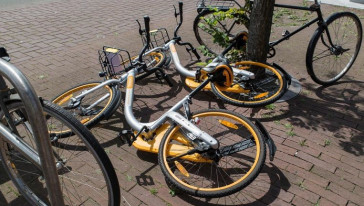De lunchlezing bestaat uit twee gedeeltes. In het eerste gedeelte zal Dirk ingaan op inzichten uit de literatuurstudie naar de gebruikerskant van Product Service Systemen (PSS) en state-of-the-art ontwerpaanpakken om milieu-impact uit dit gebruik te verkleinen. In het tweede gedeelte wordt ingegaan op de eerste inzichten uit de Case Study met en bij The Student Hotel. In deze veldstudie onderzoeken wij hoe het fiets-deelsysteem (daaronder verstaan wij de fiets zelf, de fietsenstalling en de uitleen-app) anders ontworpen kan worden, zodat gebruikers zorgvuldiger met de fietsen omgaan. Gewenste gevolgen zijn minder milieu-impact uit gebruik, lagere kosten en een positievere gebruikerservaring. Er is tussendoor en aan het einde van de lezing ruimte om vragen te stellen via de chat.
DOCUMENT
There is an increasing awareness that the landscape around cities can contribute significantly to the well-being of urban citizens. Various studies and experiences in the Netherlands and other countries show that the combination of agriculture with care and education has great potential. The number of care farms has increased from 75 in 1999 to 500 in 2005. In urban areas, a diversity of groups can benefit from care farms or other types of social services in the rural area. It concerns among others, people with mental problems, with (chronic) psychiatric demands, with addiction problems, elderly, children with behavior and/or psychological problems and long term unemployed. The city of Amsterdam recognizes the unique and valuable qualities of the rural area and its potential for the well-being of its citizens. In and around Amsterdam various organizations have initiated innovative projects that connect urban demands with agricultural entrepreneurs. A transition to a new kind of agriculture and landscape contributing to health and well-being of urban citizens is possible.
DOCUMENT

Product Service Systemen (PSS) hebben vaak als doel de milieu-impact van producten de verkleinen, maar leiden niet automatisch tot duurzame oplossingen voor de productie van diensten en producten. Er kunnen zelfs effecten optreden die tot een grotere milieu-impact leiden en de dienst minder duurzaam maken.

Product Service Systemen (PSS) hebben vaak als doel de milieu-impact van producten de verkleinen, maar leiden niet automatisch tot duurzame oplossingen voor de productie van diensten en producten. Er kunnen zelfs effecten optreden die tot een grotere milieu-impact leiden en de dienst minder duurzaam maken. Doel Aanbieders van PSS hebben meestal het eigendom over de producten en zijn gebaat bij producten die lang mee gaan en eenvoudig te vervangen zijn. Dit moedigt producenten aan tot circulaire en duurzamere productie. Dit promotieonderzoek is erop gericht te onderzoeken hoe de diensten duurzamer geproduceerd kunnen worden, waardoor de milieu-impact binnen product-dienst systemen wordt verkleind. Looptijd 01 januari 2020 - 01 januari 2024 Resultaten Een van de resultaten is een reeks van vier kaartensets (of 'routes') die kunnen dienen als hulpmiddel tijdens het ontwerpproces. Ze geven een gemeenschappelijk vocabulaire tussen ontwerpers en andere stakeholders, kunnen helpen bij het maken van ontwerpkeuzes en het valideren van ontwerpconcepten en -oplossingen. Bovenstaande kaarten zijn te downloaden via de links: Control Route (groen), Intimate Knowledge Route (geel), Strategische Keuzes (rood), Self Investment Route (blauw). Lunchlezing 'Hoe kunnen we duurzamer gebruik van producten-als-dienst ontwerpen?' vond plaats op woensdag 16 december 2020, 12:30 - 13:30 uur. Aanpak Het onderzoek naar de gebruikerskant van Product Service Systemen is een praktijkgericht en ontwerpend onderzoek naar de milieu-impact van het gebruik van Product Service Systemen (PSS). Een eerste case study vond plaats bij en in samenwerking met The Student Hotel. In deze veldstudie wordt onderzocht hoe het fiets-deelsysteem (daaronder wordt verstaan: de fiets zelf, de fietsenstalling en de uitleen-app) anders ontworpen kan worden, zodat gebruikers zorgvuldiger met de fietsen omgaan. Gewenste gevolgen zijn minder milieu-impact uit gebruik, lagere kosten en een positievere gebruikerservaring.